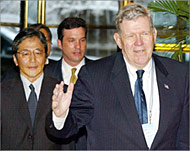US and North Korea talks tense
The six countries meeting for crisis talks in Beijing have agreed that a nuclear-free Korean peninsula is the goal of all sides.

As negotiators from North and South Korea, the United States, Russia, Japan and the host China held a series of “one on one” meetings on Thursday afternoon, China’s delegation remained adamant a diplomatic solution could be found.
“The parties reiterated that denuclearisation of the Korean peninsula is the common goal of all sides and the nuclear issue should be resolved peacefully through diplomatic means,” the Chinese foreign ministry said on its website – www.fmprc.co.cn
China’s harmonious gloss stood at odds with comments from the US and Japan, on the second day of the landmark talks to resolve the nuclear stalemate.
Wednesday’s session had been distinguished by the informal chat US Assistant Secretary of State James Kelly had with North Korean Deputy Foreign Minister Kim Yong-il as they sat together on a sofa during a coffee break – the first such conversation in four months.
But the United States followed up the rare encounter by spurning Pyongyang’s demand for formal bilateral meetings.
“There will not be any separate formal bilateral meetings with the North Koreans,” a US embassy spokeswoman said in Beijing.
Core demand
In a further sign of the vast divisions at the table, the United States has already rejected North Korea’s core demand that the two sign a non-aggression treaty, a Japanese press report said.
 |
|
James Kelly’s (R) brief is simply to listen |
The United States, which says Pyongyang may already have one or two nuclear weapons, is looking initially for a commitment that Pyongyang will scrap its programme. North Korea wants security guarantees before dismantling.
Last year US President George Bush lumped North Korea in an “axis of evil” with pre-war Iraq and Iran, infuriating North Korea’s reclusive leader, Kim Jong-il.
Japan, within range of North Korean missiles and the only country to have suffered a nuclear attack, has insisted Pyongyang must not be allowed to develop nuclear weapons. Tokyo also wants issues such as Pyongyang’s missile programme and its abduction of Japanese nationals in the 1970s and 1980s to be addressed.
Japan and North Korea held talks on Thursday but showed little sign of resolving a row over the abductions.
With Kelly holding a brief only to listen, and North Korea’s most junior deputy foreign minister certainly unable to act without approval from “Dear Leader” Kim, real progress appears virtually impossible.
Russia agreed that North Korea is interested in the denuclearisation of the Korean peninsula and does not intend to own nuclear weapons, China’s Xinhua news agency quoted Russian delegate Alexander Losyukov as saying.
S Korea plays safe
“Discussion today focused on how to announce the result of the talks,” said South Korean delegation spokesman Shim Bong-kil.
“All of the delegates are working hard on the wording of the final statement,” he said.
Seoul’s Yonhap News Agency quoted a high-ranking South Korean government official in Beijing as saying that a second round of six-way talks was likely to take place in the Chinese capital in October. There was no immediate confirmation of the report, which was contradicted by the Japanese delegation, who emerged from the talks saying major differences remained and that no decision had been made on whether follow-up talks would take place in October.
The talks are seen as just the first in a series of tough rounds of negotiation based on agreement among the five other parties that Pyongyang must not develop nuclear weapons.
Even agreement to meet again would likely be hailed as a sign of success in handling Pyongyang’s half-declared desire to become a nuclear power that triggered the standoff.